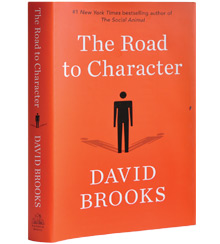Best Business Books 2015: Managerial Self-Improvement
What a Character!
A version of this article appeared in the Winter 2015 issue of strategy+business.
David Brooks
The Road to Character (Random House, 2015)
Fred Kiel
Return on Character: The Real Reason Leaders and Their Companies Win (Harvard Business Review Press, 2015)
Jeffrey Pfeffer
Leadership BS: Fixing Workplaces and Careers One Truth at a Time (HarperBusiness, 2015)
In 1859, as Great Britain’s Victorian era steamed into its third decade, a Scotsman named Samuel Smiles published a book titled Self-Help; with Illustrations of Character and Conduct. In it, Smiles preached “the practice of the virtues of industry, frugality, temperance, and honesty,” copiously illustrating its transformative power with “the instances of men, in this and other countries, who, by dint of persevering application and energy, have raised themselves from the humblest ranks of industry to eminent positions of usefulness and influence in society.”
Self-Help was a hit in England and farther afield; the aspiring entrepreneurs of the Meiji Restoration made it a bestseller in Japan. The book catapulted 47-year-old Smiles to gurudom, and, as is the wont of gurus, he wrote several volumes that capitalized on the popularity of his boot-strapping thesis over the next four decades. Thus, Smiles played an instrumental role in launching the broad category of business books under consideration here: self-improvement books for managers.
In addition to the literary impetus Smiles provided to would-be gurus, he anticipated this year’s most notable managerial self-improvement theme by about a century and a half. In his book Character (1871), he wrote, “In the affairs of life or of business, it is not intellect that tells so much as character — not brains so much as heart — not genius so much as self-control, patience, and discipline, regulated by judgment.” Character building and its rewards are the principal focus of two of this year’s three best business books on the theme of self-improvement for managers. The third — the best of the bunch — reminds us to take the first two with a grain of salt.
Smiles Reincarnate
New York Times columnist David Brooks doesn’t mention Samuel Smiles in his book The Road to Character, but it turns out the two authors have much in common. Like Smiles, Brooks pegs character as the most important measure of a person. “If you don’t develop a coherent character,” he warns us, “life will fall to pieces sooner or later.” And like Smiles, he seeks to illuminate character with the life stories of a selected group of people. The greater part of The Road to Character is devoted to extended biographical sketches of a diverse set of well-known and lesser-known luminaries, including Frances Perkins, Dorothy Day, George C. Marshall, Dwight D. Eisenhower, and civil rights activists A. Philip Randolph and Bayard Rustin.
Brooks’s subjects struggle mightily to build a strong character, and they use their strength of character as a lever to change the world. Frances Perkins was a “small, cute, almost mousy young lady,” raised among the bourgeoisie of Boston at the end of the 19th century. She was educated at Mount Holyoke College, where she began to imagine something more fulfilling than the life of a Beacon Hill matron. That desire hardened into a lifelong vocation that eventually took precedence over her personal life and family in 1911, after Perkins watched workers jumping to their deaths to avoid the flames in New York City’s Triangle Shirtwaist Factory fire. “Her own desires and her own ego became less central,” writes Brooks. “The niceties of her class fell away.”
Perkins dove into the unladylike business of machine politics, lobbying and compromising as necessary to pass workplace protection legislation. New York governor Al Smith appointed her to the Industrial Commission, which regulated working conditions throughout New York State. There, she caught the eye of Franklin Delano Roosevelt, whom she initially found “shallow and a bit arrogant.” Perkins, the first female cabinet secretary, served as labor secretary throughout FDR’s entire presidential tenure. Brooks tells us that she was central to the creation of the Social Security System and the Fair Labor Standards Act, which mandated a minimum wage and overtime pay. She was a major force in the creation of New Deal agencies that put U.S. employees back to work during the Great Depression, including the Civilian Conservation Corps, the Federal Works Agency, and the Public Works Administration.
Brooks parts ways with Smiles over the purpose of character building. Where Smiles sees it as a driver of material success, Brooks sees it as the path to spiritual salvation. Brooks urges the development of “eulogy virtues,” moral qualities of the kind that people talk about at funerals, such as bravery, integrity, and loyalty. He suggests that people focus less on the “resumé virtues,” talents and skills that bolster careers.
Brooks argues that we place too much emphasis on resumé virtues because our “moral ecology” has shifted from the “little me” culture of humility, generosity, self-sacrifice, and selflessness that he says typified the “greatest generation” to today’s “big me” culture of self-promotion, self-esteem, self-actualization, and outright selfishness. (This may be true, but like me, Brooks is a 50-something white guy and a baby boomer. So perhaps he is imbuing the good old days with a nostalgic glow that is not altogether justified.)
In any case, the road to character, as Brooks portrays it, is a rocky one, and its rewards are intangible: self-understanding, joy, peace, and oneness with others. If a life like that sounds good to you, be sure to pay extra close attention to the book’s character-building insights and lessons, which Brooks sums up in a “humility code” in the final chapter.
Does Character Pay?
Whereas Brooks explores the intrinsic rewards of character, Fred Kiel seeks to tease out a more tangible payoff. In Return on Character: The Real Reason Leaders and Their Companies Win, the executive coach and cofounder of KRW International reports on his quest to determine whether the personal character of managers has any connection to better business results. And it is nothing less than a quest: “As I approach my seventy-fifth birthday, I have a dream,” writes Kiel. “I hope to inspire a movement where people demand character-driven leadership because it delivers higher value to all stakeholders — and because it’s the right thing to do.”
Toward this end, Kiel underwrote a seven-year descriptive research study that seems to have been conducted with much zeal (if a bit less financing and scientific rigor than is typical). To study leadership character, he first identified the four “universal principles” that define it — these are integrity, responsibility, forgiveness, and compassion. Then, he defined three or four behaviors that indicate the presence of each of these so-called Keystone Character Habits in a leader.
Next, by word of mouth and happenstance, Kiel recruited 84 CEOs (82 in U.S. companies and two in Canadian companies) who agreed to participate in the study after learning its parameters and purpose. These CEOs provided data about themselves and their behaviors via surveys, assessments, and interviews. To confirm the CEOs’ characters, employees from each of their companies (8,400 employees in all) filled out surveys about their CEO’s behaviors and the behavior of their company’s senior management team. Then, each CEO was asked to provide corporate financial information, which was used to calculate average return on assets (ROA) over two years, a requirement that prompted 40 of them to drop out of the study. Finally, leadership character was correlated with ROA.
What did Kiel discover? “There is an observable and consistent relationship between character-driven leaders and better business results,” he writes. “Leaders with stronger morals and principles do, in fact, deliver a Return on Character, or ROC. Organizational leadership that ranks high on the ROC character-assessment scale achieves nearly five times the return on assets that leaders who fall at the bottom of the curve achieve.”
At this point, a data scientist would probably feel compelled to issue several cautions about the conclusions derived from Kiel’s study. One caution might involve the very small sample of self-selected subjects and the distortions that size is likely to create. Another might involve the fact that a CEO is not the only — or even the primary — determinant of a company’s business results. So it’s hard to know what weight to assign the link between character and ROA.
Given the limitations of the study, you might wonder why I chose Return on Character as one of the year’s best business books on managerial self-improvement. The answer: I give it an A for effort and ambition. Kiel provides a foundation for further inquiry into the role and importance of character in managerial effectiveness at every level in every kind of organization.
Moreover, if the character of the people who manage a business is actually related to the performance of that business, there are significant ramifications for managers and the people who hire them. Such a finding might, for instance, bridge the distinction that Brooks draws between eulogy virtues and resume virtues. Managerial self-improvement might include a healthy emphasis on understanding and developing your character. Companies might start evaluating the character of new hires in a more rigorous way and seek out leaders who demonstrate integrity, responsibility, forgiveness, and compassion. Where might that lead?
A BS Detector
Of course, if leadership character isn’t actually linked to business performance, it could simply become one more reason for Jeffrey Pfeffer to indict the “almost limitless number of books, articles, speeches, workshops, blogs, conferences, training sessions, and corporate development efforts” produced by the so-called leadership industry. In Leadership BS: Fixing Workplaces and Careers One Truth at a Time, the Thomas D. Dee II Professor of Organizational Behavior at Stanford University’s Graduate School of Business proclaims the industry of which he is a stalwart member to be a failure by the only measure that really matters: how often it makes good on its promise to produce more effective leaders.
Pfeffer isn’t the first professor to bite the hand that feeds him, and he surely won’t be the last. But what makes Leadership BS notable is that he tries not to contribute to the problem. (Most indictments of the industry quickly cut to the chase, which is the promotion of the accuser’s own leadership effectiveness scheme.) Instead, Pfeffer demolishes some of the industry’s most popular ideas and shows managers seeking self-improvement how to winnow out content that won’t help them or their employers.
The idea of the authentic leader — and the books, seminars, and training programs that have sprung up around it — sets off Pfeffer’s BS detector. “The idea that one would and could be trained to become or at least appear authentic oozes with delicious irony,” he writes. More importantly, authenticity is the last thing leaders should aspire to attain. “Leaders do not need to be true to themselves,” he argues. “Rather, leaders need to be true to the situation and what those around them want and need from them.” I imagine David Brooks, with his insistence that character building requires conquering ego, nodding along.
The idea of the authentic leader — and the books and seminars that have sprung up around it — sets off Pfeffer’s BS detector.
Pfeffer similarly demolishes a number of traits that aspiring leaders are often advised to develop, including humility, honesty, trust, and a primary focus on the welfare of others. He’s not saying that these idealized traits are undesirable in and of themselves. Instead, he is a realist who studies and teaches the nature and use of leadership power. He’s saying that no matter what we say we want in leaders, what we hire for — and what we reward — in leaders is often the diametric opposite.
Finally, Pfeffer delivers the payoff for managers bent on improving their leadership fortunes. If you want to rise to become a leader and become successful as a leader, he counsels, you’d better be grounded in reality (who you hire and reward) rather than in some wistful vision of what leadership could be. Somewhere Machiavelli is clapping with admiration and delight.
And so am I. David Brooks’s Road to Character is an inspiring read that could make you a better, stronger person. Fred Kiel’s Return on Character is a hopeful one that suggests character-driven leadership might be more than a pipe dream. And Pfeffer’s Leadership BS, the best business book of the year for managerial self-improvement, will keep you from getting your hands stomped on during the long, sweaty climb up the corporate ladder.
Reprint No. 00378
Author profile:
- Theodore Kinni is a contributing editor of strategy+business. He has written, as a named author or a ghostwriter, 15 business books.





